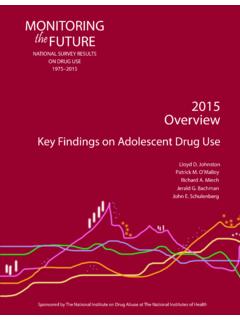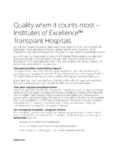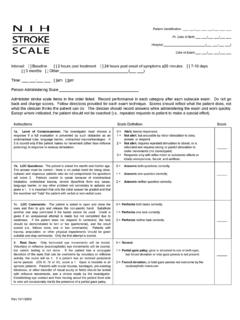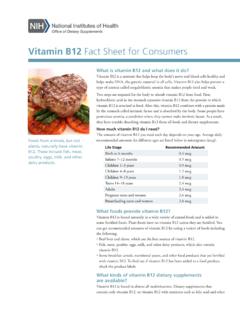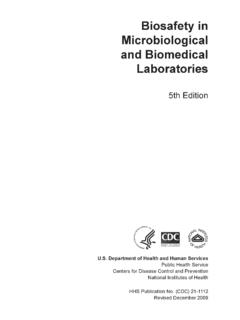Transcription of National Institutes of HealtDEPARTMENT OF HEALTH AND …
1 NIH Consensus Development Conference on celiac disease June 28 30, 2004 William H. Natcher Conference Center National Institutes of HEALTH Bethesda, Maryland Sponsored by: National institute of Diabetes and Digestive and Kidney Diseases Office of Medical Applications of Research Cosponsored by: Food and Drug Administration Department of Agriculture National institute of Child HEALTH and Human Development National Cancer institute National institute of Allergy and Infectious Diseases DEPARTMENT OF HEALTH AND HUMAN SERVICES National Institutes of HEALTH Contents Agenda ..3 Panel Speakers ..11 Planning Abstracts ..17 I. How Is celiac disease Diagnosed? Overview and Pathogenesis of celiac disease Martin F. Kagnoff, ..19 The Pathology of celiac disease Paul J. Ciclitira, , , What Are the Sensitivity and Specificity of Serological Tests for celiac disease ? Do Sensitivity and Specificity Vary in Different Populations?
2 Ivor D. Hill, ..27 Clinical Algorithm in celiac disease Ciaran P. Kelly, ..33 Genetic Testing: Who Should Do the Testing and What Is the Role of Genetic Testing in the Setting of celiac disease ? George S. Eisenbarth, ..37 Serological Testing for celiac disease Alaa Rostom, , , FRCPC ..41 II. How Prevalent Is celiac disease ? Epidemiology of celiac disease : What Are the Prevalence, Incidence, and Progression of celiac disease ? Marian J. Rewers, , What Are the Prevalence and Incidence of celiac disease in High-Risk Populations: Patients With an Affected Family Member, Type 1 Diabetes, Iron-Deficiency Anemia, and Osteoporosis? Joseph A. Murray, Incidence and Prevalence of celiac disease Alaa Rostom, , , FRCPC ..57 iii III. What Are the Manifestations and Long-Term Consequences of celiac disease ? Clinical Presentation of celiac disease in the Pediatric Population Alessio Fasano, The Many Faces of celiac disease : Clinical Presentation of celiac disease in the Adult Population Peter Green.
3 65 Association of celiac disease and Gastrointestinal (GI) Lymphomas and Other GI Cancers Carlo Catassi, , ..69 Skin Manifestations of celiac disease John J. Zone, Neurological/Psychological Presentation of celiac disease : Ataxia, Depression, Neuropathy, Seizures, and Autism Khalafalla O. Bushara, ..77 IV. Who Should Be Tested for celiac disease ? Should Children Be Screened for celiac disease ? Is There Evidence To Support the Strategy of Screening All Children? Edward J. Hoffenberg, Should Adults Be Screened for celiac disease ? What Are the Benefits and Harms of Screening? Pekka Collin, , ..83 Consequences of Testing for celiac disease Ann Cranney, , V. What Is the Management of celiac disease ? Dietary Guidelines for celiac disease and Implementation Cynthia Kupper, , How To Provide Effective Education and Resources: Gluten-Free Diets Shelley Case, ..97 The Followup of Patients With celiac disease Achieving Compliance With Treatment Michelle Maria Pietzak, iv Introduction Background celiac disease is a disorder primarily affecting the gastrointestinal tract that is characterized by chronic inflammation of the mucosa, which leads to atrophy of intestinal villi, malabsorption, and protean clinical manifestations that may begin either in childhood or adult life.
4 Symptoms can include abdominal cramping, bloating, and distention, and untreated celiac disease may lead to vitamin and mineral deficiencies, osteoporosis, and other problems. The disease is also strongly associated with the skin disorder, dermatitis herpetiformis. celiac disease s major genetic risk factors (HLA-DQ2 and HLA-DQ8) and environmental triggers (specific peptides present in wheat, rye, and barley) have been identified, and most patients experience complete remission after exclusion of these grains from the diet. Thus, there has been considerable scientific progress in understanding this complex disease and in preventing or curing its manifestations by dietary interventions. At the present time, celiac disease is widely considered to be a rare disease in the United States. However, recent studies, primarily in Europe but also in the United States, suggest that its prevalence is much higher than previous estimates, raising the concern that the disease is widely under-recognized.
5 Recent progress in identification of autoantigens in celiac disease have led to the development of new serological diagnostic tests, but the appropriate use of testing strategies has not been well defined. Some patients with celiac disease may be at risk for non-Hodgkin s lymphoma, a rare cancer affecting the gastrointestinal tract. It is not yet clear, however, what the impact of this observation should be on diagnostic and treatment strategies. Conference Process To address these issues, the National institute of Diabetes and Digestive and Kidney Diseases (NIDDK) and the Office of Medical Applications of Research (OMAR) of the National Institutes of HEALTH (NIH) are sponsoring a consensus development conference to explore and assess the current scientific knowledge regarding celiac disease . The conference will be held June 28 30, 2004, at NIH in Bethesda, Maryland. Specifically, the conference will address the following key questions: How is celiac disease diagnosed?
6 How prevalent is celiac disease ? What are the manifestations and long-term consequences of celiac disease ? Who should be tested for celiac disease ? 1 What is the management of celiac disease ? What are the recommendations for future research on celiac disease and related conditions? During the first 1 1/2 days of the conference, experts will present the latest celiac disease research findings to an independent panel. After weighing all of the scientific evidence, the panel will prepare a consensus statement answering the questions above. On the final day of the conference, the panel chairperson will read the draft statement to the conference audience, and invite comments and questions. A press conference that afternoon will allow the panel to respond to questions from the media. General Information Conference sessions will be held in the Natcher Conference Center, NIH, Bethesda, Maryland. The conference may be viewed live via Webcast at Webcast sessions will also be available after the conference.
7 The dining center in the Natcher Conference Center is located on the main level, one floor above the auditorium. It is open from 6:30 to 2:30 , serving hot breakfast and lunch, sandwiches and salads, and snack items. An additional cafeteria is available from 7:00 to 3:30 , in Building 38A, level B1, across the street from the main entrance to the Natcher Conference Center. The telephone number for the message center at the Natcher Conference Center is 301-594-7302. Conference Sponsors The primary sponsors of the conference are NIDDK and OMAR of the NIH, a component of the Department of HEALTH and Human Services. The conference is cosponsored by the Food and Drug Administration, the Department of Agriculture, the National institute of Child HEALTH and Human Development, the National Cancer institute , and the National institute of Allergy and Infectious Diseases. The National Library of Medicine (NLM) and the Agency for Healthcare Research and Quality (AHRQ) provided additional support to conference development.
8 Financial Disclosure Each speaker presenting at this conference has been asked to disclose any financial interests or other relationships pertaining to this subject area. Please refer to the material in your participant packet for details. Panel members signed a confirmation that they have no financial or other conflicts of interest pertaining to the topic under consideration. 2 AGENDA Monday, June 28, 2004 8:30 Opening Remarks Allen M. Spiegel, Director National institute of Diabetes and Digestive and Kidney Diseases National Institutes of HEALTH 8:40 Charge to the Panel Susan Rossi, , Deputy Director Office of Medical Applications of Research, Office of the Director National Institutes of HEALTH 8:50 Conference Overview and Panel Activities Charles O. Elson, Panel and Conference Chairperson Professor of Medicine and Microbiology Vice Chair for Research, Department of Medicine University of Alabama at Birmingham I.
9 How Is celiac disease Diagnosed? 9:00 Overview and Pathogenesis of celiac disease Martin F. Kagnoff, Professor of Medicine and Pediatrics Cancer Biology Program University of California at San Diego 9:20 The Pathology of celiac disease Paul J. Ciclitira, , , FRCP Professor The Rayne institute St. Thomas Hospital United Kingdom 9:40 What Are the Sensitivity and Specificity of Serological Tests for celiac disease ? Do Sensitivity and Specificity Vary in Different Populations? Ivor D. Hill, Professor of Pediatrics Wake Forest University School of Medicine 3 Monday, June 28, 2004 (continued) I. How Is celiac disease Diagnosed? (continued) 10:00 Discussion Participants with questions or comments for the speakers should proceed to the microphones and wait to be recognized by the panel chair. Please state your name and affiliation.
10 Questions and comments not heard before the close of the discussion period may be submitted at the registration desk. Please be aware that all statements made at the microphone or submitted later are in the public domain. 10:30 Clinical Algorithm in celiac disease Ciaran P. Kelly, Director, celiac Center Herrman L. Blumgart Firm Chief Director, Gastroenterology Fellowship Training Associate Professor of Medicine Beth Israel Deaconess Medical Center Harvard Medical School 10:50 Genetic Testing: Who Should Do the Testing and What Is the Role of Genetic Testing in the Setting of celiac disease ? George S. Eisenbarth, Executive Director Barbara Davis Center for Childhood Diabetes University of Colorado HEALTH Sciences Center 11:10 Evidence-Based Practice Center Presentation: Serological Testing for celiac disease Alaa Rostom, , , FRCPC Assistant Professor Division of Gastroenterology University of Ottawa The Ottawa Hospital Civic Campus 11:30 Discussion 12:00 Lunch 4 Monday, June 28, 2004 (continued) II.

